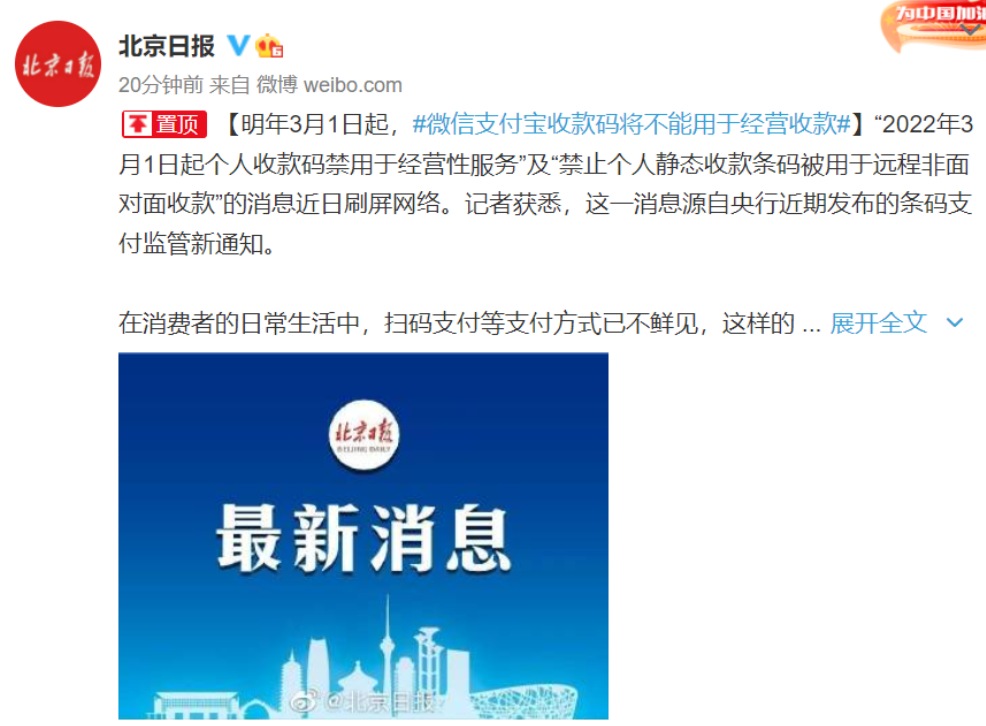据北京日报报道,2021 年 10 月 13 日,中国人民银行官网发布《中国人民银行关于加强支付受理终端及相关业务管理的通知(银发〔2021〕259 号)》,从支付受理终端业务管理、特约商户管理、收单业务监测三个方面入手,对收单机构和清算结构提出了一系列的管理要求。与此同时,条码支付也被纳入监管,对个人收款条码的使用规范做出具体规定,并将于 2022 年 3 月 1 日起施行。 According to Beijing Daily, on October 13, 2021, the official website of the People’s Bank of China issued the “Notice of the People’s Bank of China on Strengthening the Management of Payment Acceptance Terminals and Related Businesses (Yinfa [2021] No. 259)". Starting from the three aspects of merchant management and acquiring business monitoring, a series of management requirements are put forward for acquiring institutions and clearing structures. At the same time, barcode payment has also been included in the supervision, and specific regulations have been made on the use of barcodes for personal receipts, which will be implemented on March 1, 2022.
According to Beijing Daily, on October 13, 2021, the official website of the People’s Bank of China issued the “Notice of the People’s Bank of China on Strengthening the Management of Payment Acceptance Terminals and Related Businesses (Yinfa [2021] No. 259)". Starting from the three aspects of merchant management and acquiring business monitoring, a series of management requirements are put forward for acquiring institutions and clearing structures. At the same time, barcode payment has also been included in the supervision, and specific regulations have been made on the use of barcodes for personal receipts, which will be implemented on March 1, 2022.
[Heavy! From March 1 of next year, WeChat and Alipay personal collection codes cannot be used for business collection] Main supplementary content of the new regulations: 1. Restrict remote collection of personal collection codes 2. Personal collection codes cannot be used for business collections 3 , Receiving barcodes should develop a classification management system to distinguish between individuals and special merchants. Those with business activities are included in the scope of special merchants. It is understood that the "Notice" explains the management of payment barcodes, and it is generated for individual or special merchants and other recipients. Yes, the receipt barcode used by the payer to read and initiate payment instructions should effectively distinguish the scenarios and uses of receipt barcodes used by individuals and special merchants, and prevent receipt barcodes from being rented, lent, sold or used for illegal activities. For individuals with obvious characteristics of business activities, barcode payment collection service agencies shall not provide them with payment collection services related to business activities through personal payment collection barcodes.
The "Notice" also explains the remote non-face-to-face collection of payments. Bar code payment collection service agencies shall take effective measures to prohibit personal static collection bar codes from being used for remote non-face-to-face collection. For personal dynamic receipt barcodes saved through screenshots, downloads, etc., the relevant regulations on the implementation of personal static receipt barcodes shall be referred to. "Incorporating bar code payment into supervision has made up for the loopholes in the bar code payment channel that may have been used by money laundering." Wang Pengbo, chief analyst of Broadcom Consulting, analyzed that, especially for the management of personal collection codes, the requirements of the "Notice" will be effectively avoided. The personal collection code channel is used by the trading platform.
The article "Restrict remote collection of personal code" is mainly aimed at illegal activities such as "scoring", "gambling", and "telecommunications fraud" that have been frequently issued in recent years. In the future, the personal collection code will restrict the remote collection function, and may become a dynamic collection code, which no longer has the printing function. If some special merchants do have remote non-face-to-face needs, they can apply for a special merchant collection code, which will be carefully reviewed by the acquirer, a whitelist will be added, and transaction limits, scale, and QR code usage will be strictly controlled.
What impact does the "Notice" have on consumers and small and micro businesses? The relevant person in charge of the central bank stated that the "Notice" generally helps to better protect the legitimate rights and interests of consumers, and helps prevent lawbreakers from stealing consumer personal information and even embezzling account funds by modifying payment acceptance terminals and applying for false merchants. It is conducive to improving the service quality of banks and payment institutions such as account statements and transaction information inquiries, fully guaranteeing consumers' right to know, and reducing related disputes and complaints; in the long run, the relevant requirements of the "Notice" regarding the regulation of personal payment codes will be further improved The quality of acquiring services for individual operators and small and micro merchants.
[重磅!明年 3 月 1 日起,微信、支付宝个人收款码不能用于经营收款]
新规主要补充内容:
1、限制个人收款码远程收款
2、个人收款码不得用于经营收款
3、收款条码要制定分类管理制度,区分个人和特约商户,有经营活动的划入特约商户范围
了解到,《通知》对收款条码管理进行了说明,对于个人或特约商户等收款人生成的,用于付款人识读并发起支付指令的收款条码,应有效区分个人和特约商户使用收款条码的场景和用途,防范收款条码被出租、出借、出售或用于违法违规活动。对于具有明显经营活动特征的个人,条码支付收款服务机构不得通过个人收款条码为其提供经营活动相关收款服务。
《通知》还对远程非面对面收款进行了说明。条码支付收款服务机构应当采取有效措施禁止个人静态收款条码被用于远程非面对面收款。对于通过截屏、下载等方式保存的个人动态收款条码,应当参照执行个人静态收款条码有关规定。“将条码支付纳入监管,弥补了之前可能被洗钱利用比较多的条码支付通道漏洞。”博通咨询首席分析师王蓬博分析称,特别是对个人收款码的管理,《通知》的要求会有效避免个人收款码通道被交易平台利用。
“限制个人码远程收款”此条主要是针对近几年频发的“跑分”、“赌博”、“电信诈骗”等违法行为。未来个人收款码将限制远程收款功能,可能变成动态收款码,不再具备打印功能。若部分特殊类商户确实有远程非面对面需求,可申请特约商户收款码,由收单机构进行谨慎审核,添加白名单,并且会严格把控交易限额、规模、二维码使用次数等。
《通知》对消费者和小微商户有哪些影响?央行相关负责人表示,《通知》总体上有助于更好保护消费者合法权益,有利于防范不法分子通过改造支付受理终端、申请虚假商户等手段盗取消费者个人信息,甚至盗用账户资金,有利于提升银行、支付机构的对账单、交易信息查询等服务质量,充分保障消费者知情权,减少相关纠纷和投诉;长远来看,《通知》关于规范个人收款码的相关要求将进一步提升对个人经营者和小微商户的收单服务质量。
